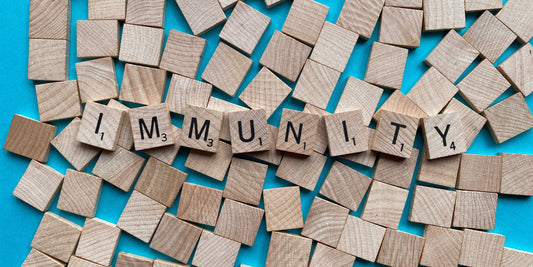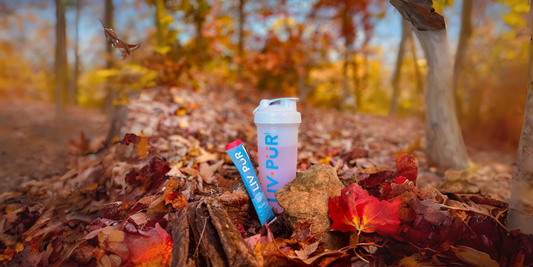Chances are if you are asking the question then you are. Don't worry. You aren't alone. According to latest study on adult dehydration, 75% of Americans are dehydrated. Most only drink 2.5 cups of water daily. This is because most people don't like the taste of plain water. Water tastes differently depending on where you are in the country. Near the coastline, water can be more sulfuric versus in middle America.
It is important to recognize the dangerous warning signs of dehydration. and we have an easily and delicious solution.
1. Dizziness
 Dehydration may cause you to feel dizzy and light-headed, especially when you stand up. The medical term for this is orthostatic hypotension, which can be caused by dehydration. Severe dehydration can lead to fainting.
Dehydration may cause you to feel dizzy and light-headed, especially when you stand up. The medical term for this is orthostatic hypotension, which can be caused by dehydration. Severe dehydration can lead to fainting.
2. Dark Yellow Urine
Usually, the darker color the urine the less water in your system. The dark color comes from the body conserving water and not releasing it into the urine. Thus, the urine becomes more concentrated with waste products. The ideal urine color is not completely clear but actually pale yellow like light straw.
3. Headaches
Dehydration headaches can vary and the pain can vary as well. Some have severe pain and others mild. Pain could be concentrated to one spot such as the back, front or side of the head or a dull or sharp ache. The pain could get worse when bending over, shaking the head or moving around.
The only way to know if it is indeed a dehydration headache is if it dissipates with water and rest.
4. Dry Mouth & Skin
Having dry mouth and skin are one of the most common signs of dehydration. This includes cracking of the lips. Dry skin and cracked lips are signs of many other health conditions even when drinking correct fluid levels. It is important to mention this symptom to your doctor.
5. Muscle Cramps
When the cycle of dehydration sets in, fluids deplete faster. Your body reacts by storing water for the most vital organs like heart and lungs. Therefore, the less vital ones (muscles) will start to cramp. Many experience leg cramps in the calves and thighs along with muscle spasms. Stomach cramps are also common.
6. Fatigue
Dehydration affects all aspects of health including sleep. Those who are not hydrated enough don't sleep as well and thus feel more fatigued. This includes those who also exercise frequently.
7. Brain Fog
 Not having enough water can reduce your brain's ability to concentrate. A study of a group of young and healthy women who restricted their water intake to 6 oz a day found that they performed worse on cognitive tests than when fully hydrated.
Not having enough water can reduce your brain's ability to concentrate. A study of a group of young and healthy women who restricted their water intake to 6 oz a day found that they performed worse on cognitive tests than when fully hydrated.
Your brain is made up of 75% water and needs fluids to function properly.
8. Heart Palpitations
Many experience cardiac symptoms like heart palpitations. This is the sensation of irregular heartbeat or pounding of the heart. This is due to dehydration impairing blood vessel function and blood pressure regulation.
How to Drink More Water
Luckily, managing hydration is simple for most people. With just a few lifestyle changes, you can increase your hydration and help keep dehydration at bay:
Water
For the most part, staying hydrated and warding off dehydration is simple. It starts with drinking water — and enough of it.
How much water should you drink a day? The general recommendation for water intake is half an ounce to an ounce of water for every pound you weigh. That means if you weigh 160 pounds, you should drink 80–160 ounces of water each day.
However, this recommendation is just a good rule of thumb — as water needs vary from person to person based on their unique makeup and level of activity throughout the day.
Electrolytes
When you’re dehydrated or over-hydrated, your electrolyte levels become unbalanced. That’s why when considering your hydration levels, I believe it’s important to also consider electrolyte balance.
Electrolytes are minerals in your body that contain an electrical charge. Among other things, they help balance the amount of water in your body. Sodium, calcium, potassium, chloride, phosphate, and magnesium are all examples of electrolytes.
By taking an electrolyte supplement with the ideal ratio of electrolytes you can help keep these electrically charged minerals at an optimal level in the body.
LivPur Hydration packets were specifically formulated to nourish your body with balanced electrolytes. In a single packet, get 50 mg calcium, 35 mg magnesium, 150 mg sodium, and 50 mg potassium.
Pour the packet into a bottle of water to get the fluids and electrolytes your body craves in a single swallow.
Additional Hydration Tips
Drinking water isn’t the only way to get water into the body. You can also:
- Eat fresh fruits and vegetables
- Drink soups
- Sip on smoothies
- Try herbal teas
- And more
If you’re having trouble remembering to drink water throughout the day, even try using a water reminder app.
Conclusion
Both short-term and long-term dehydration negatively affect blood pressure, which can wreak havoc on the body if it goes unchecked.
Staying hydrated by drinking plenty of fluids and maintaining optimal electrolyte levels are two of the best ways to armor yourself from dehydration.
If you experience headaches, muscle weakness, dry mouth, decreased urination, and/or fatigue, you may be dehydrated.
The LivPur team specifically formulated Hydration to fuel your body through essential aminos acids and a healthful balance of electrolytes — all in a convenient, on-the-go powder packet you can easily mix into your water bottle. Shop hydration.
Try LivPur Hydrate:




